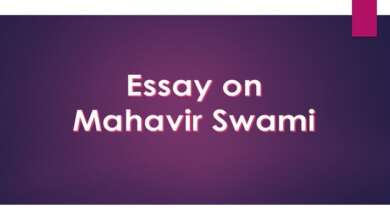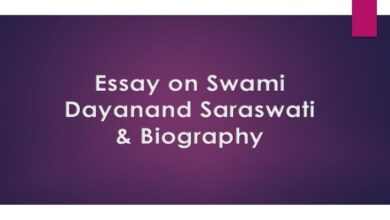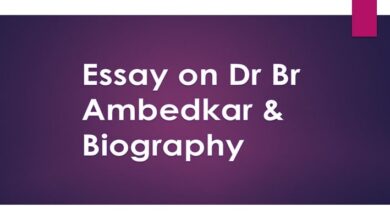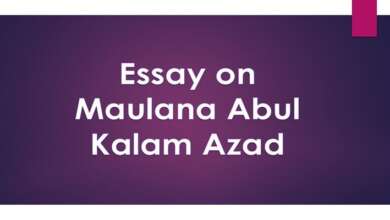Essay on Subhash Chandra Bose in 1000 Words in English | PDF
Essay on Subhash Chandra Bose
Essay on Subhash Chandra Bose in English (Download PDF) – Netaji Subhash Chandra Bose was one of the greatest patriots and brave freedom fighters of India. Netaji’s great contribution to the freedom struggle in India’s history is unforgettable. He was a symbol of passionate patriotism and always believed in violence, and chose the path of military rebellion to get freedom from British rule.
He belonged to a well-to-do family. Who gave up his home and comfort for the sake of his motherland. In 1920, he was one of the few Indians who took ICS. He passed the examination and tried to make the country in better condition. Therefore, he gave importance to his home country leaving the government job.
Birth:
The day of 23 January 1897 is inscribed in golden letters in world history. On this day, Netaji Subhash Chandra Bose, the great hero of the freedom movement, was born in Cuttack, Odisha province. His father’s name was Janakinath Bose and his mother’s name was Prabhavati Bose.
His father was a lawyer by profession and had also been the Speaker of the Bengal Legislative Assembly. He had 6 daughters and 8 sons, Subhash Chandra Bose was his ninth child and the fifth son.
Netaji, despite being the ninth child of his 14 sister-brothers, had more affection and love for his father.
Education :
Subhash Ji was very fond of reading and writing since childhood. Subhash Chandra Ji’s early education was at Ravenshaw Collegiate School, a prestigious school in Cuttack. He stood second in the matriculation examination in 1913 and enrolled in the Presidency College, Calcutta for his further studies in 1916 where he met Dr. Suresh Babu.
Even while in college, he had a glimpse of the freedom struggle. He strongly opposed the remarks made by his English teacher against India. Due to this, he was expelled from the college, then Ashutosh Mukherjee admitted him to ‘Scottish Church College’. From where he completed his first-class B.A in Philosophy.
After the B.A examination, on the orders of his father, he went to England for the ICS examination. He got admission to Cambridge University in England and returned home after passing the ICS examination from there and was appointed a high-ranking officer here.
Read also – Essay on Ravindranath Tagore
Life and Thoughts
Subhash Chandra Bose was also among the freedom fighters who sacrificed their life. For which the Indians started for the freedom of the country. Subhash Chandra Bose met Suresh Babu at the Presidency College. Suresh Babu was making an organization of youths eager to serve the country.
The path that Subhash Chandra Bose adapted for independence was different. For this reason, he did not delay participating in this organization at all. It was here that he took a hard vow to devote his life to country service forever.
Some such good thoughts of Netaji which we should highlight in our hearts for patriotism.
(1) The biggest crime is to suffer injustice and compromise with the wrong person.
(2) The most important idea was given by Subhash Chandra Bose “You give me blood, I will give you freedom”
(3) There is always a ray of hope in our life, we should just hold it and not wander.
(4) It is our duty to pay the price of freedom by ourselves and our sacrifice and sacrifice that we should keep the strength to protect the freedom that we get.
(5) No matter how customary and painful our life is, we should always keep moving forward because success is determined by hard work and dedication.
(6) He who trusts in his strength gets success. The person who gets credit success is always injured. So get success with your hard work.
(7) To live your life for your country.
(8) Always keep courage in your life, maintain strength and love from the motherland, then you will definitely get success.
We must move forward to protect the motherland on which we were born and these ideas are one of those freedom fighters warriors, Subhash Chandra Bose had no desire to live a chic life as a collector. He was a true fighter.
Bose was an important contributor to India’s independence movement. Subhash Chandra Bose had taken a violent approach, unlike Gandhi Ji. Bose advocated a revolutionary and violent way for the freedom struggle.
Freedom Movement
In 1920 Gandhiji started a non-cooperation movement in which many people were participating and there was a lot of enthusiasm among the people due to this movement. Subhash Chandra Bose was very much influenced by the life of Arvind Ghosh and Gandhiji. It is said that the Nagpur session of 1920 impressed him a lot.
On 20 July 1921, Subhash Chandra Bose met Gandhiji for the first time. Gandhiji also gave the name Netaji to Subhash Chandra Bose. During that time Gandhiji was leading the freedom movement in which people were participating very aggressively. Because Das Babu was leading the Non-Cooperation Movement in Bengal, Gandhiji advised Bose to go to Calcutta and meet Dasbabu.
Bose did not agree with Mahatma Gandhi’s ideas of non-violence. Because he was a hot-tempered revolutionary and Mahatma Gandhi was a liberal. Subhash Chandra Bose and Mahatma Gandhi knew that our ideas do not meet each other.
He had a revolutionary ideology. He did not believe in the complete non-violence movement of Congress, so he resigned from Congress. Even after not getting all these synergies, Subhash Chandra Bose addressed Mahatma Gandhi as the Father of the Nation.
He established the ‘Forward Block’ for Hindu-Muslim unity in the country. Plagued by his intense revolutionary ideas and actions, the British government sent him to jail. In prison, he went on a hunger strike, which caused unrest in the country. As a result, he was kept under house arrest.
Bose dodged the police on January 26, 1942. They reached Germany via the route of Kabul by the name of Ziauddin. German leader Hitler welcomed him. After that, he went to Japan where he formed his Indian National Army, ‘Azad Hind Fauj’
Read also – Essay on Jawaharlal Nehru
Establishment of Azad Hind Fauj
Bose saw that it is difficult to get independence without a powerful organization. On 16 March 1939, Subhas resigned from his post. He started the effort to organize the youth with full devotion, giving a new path to the freedom movement, and started on 4 July 1943 with the ‘Indian Independence Conference’ in Singapore.
With the help of Japan and Germany, he formed an army to fight against the British, which he named “Azad Hind Fauj”. On 5 July 1943, ‘Azad Hind Fauj’ was duly formed. Netaji realized his resolve on 21 October 1943 to achieve independence by organizing a group of Indians living in different countries of Asia and setting up a temporary independent Government of India.
On 12 September 1944, at the Jubilee Hall, Rangoon, on the memorial day of the martyr Yatindra Das, Netaji gave a very poignant speech – ‘Now our freedom is sure, but freedom demands sacrifice. “You give me blood, I will give you freedom”. The power of the British was shaken by the roar of Subhash Chandra Bose. Lakhs of Hindustani people were ready to sacrifice themselves behind this voice.
Death :
The Azad Hind Fauj also had to surrender due to the defeat of Japan in the Second World War. When Netaji was flying from Bangkok to Tokyo by plane and is believed that he died in a plane crash on August 18, 1945. But till date, no evidence of Netaji’s death was found. Even today some people believe that he is alive. That is why with the independence of the country, the government also set up a commission to investigate that mystery, but it did not yield any result.
Download PDF – Click Here
FAQs. on Subhash Chandra Bose
When was Subhash Chandra Bose born?
Answer – The day of 23 January 1897 is inscribed in golden letters in world history. On this day, Netaji Subhash Chandra Bose, the great hero of the freedom movement, was born in Cuttack, Odisha province. His father’s name was Janakinath Bose and his mother’s name was Prabhavati Bose.
When was Azad Hind Fauz established?
Answer – With the help of Japan and Germany, he formed an army to fight against the British, which he named “Azad Hind Fauj”. On 5 July 1943.




